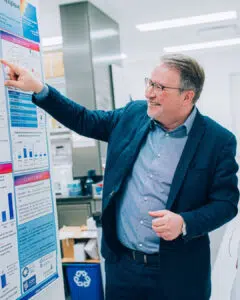OMF’s Collaborative Center at Montreal, in collaboration with our Collaborative Center at Uppsala and the Computational Research Center for Complex Diseases, has released a new paper: Haptoglobin phenotypes and structural variants associate with post-exertional malaise and cognitive dysfunction in myalgic encephalomyelitis.
From the Desk of Dr. Alain Moreau, Director of the ME/CFS Collaborative Research Center at Montreal:
 What is this study about?
What is this study about?
This study investigated a blood protein called haptoglobin (Hp), which normally protects the body from damage when red blood cells break down. OMF researchers from Montreal, Uppsala, and the OMF computation team looked at how Hp levels and genetic variants behave in people with ME/CFS, especially during post-exertional malaise (PEM)—the worsening of symptoms after even minor activity.
Why does it matter?
They found that after a mild stress challenge, people with ME/CFS showed a sharp drop in Hp levels, while healthy controls did not. Low Hp was linked to worse PEM symptoms and poorer cognitive performance (“brain fog”). Importantly, the study also revealed that certain genetic forms of Hp influence how severe PEM becomes: patients with the Hp2-1 genotype had stronger PEM and more cognitive problems, while those with Hp1-1 were more resilient. This shows that genetics directly contribute to vulnerability in ME/CFS.
What is the potential impact for people with ME/CFS?
This is the first strong evidence of a genetic contribution to PEM in ME/CFS. Hp could serve as a biomarker to better diagnose ME/CFS, identify patient subgroups, and guide clinical management. In the future, therapies that restore or replace Hp function (e.g., intravenous infusion of recombinant Hp-1-1 protein) might help protect genetically at-risk patients from post-exertional crashes and cognitive decline, offering a new pathway toward targeted treatment.
Read the full publication in the Journal of Translational Medicine.
This paper stems from the DOMINO-ME project, which is in the “Publication” stage of the research process.
